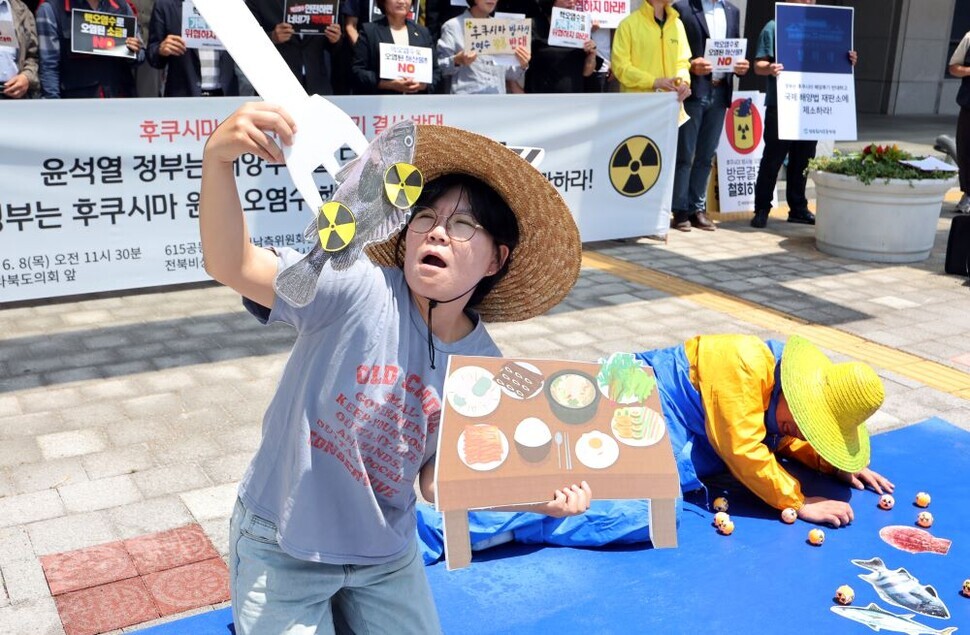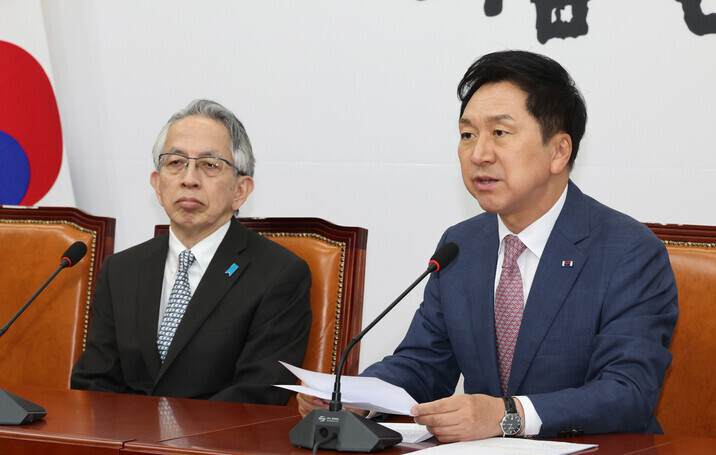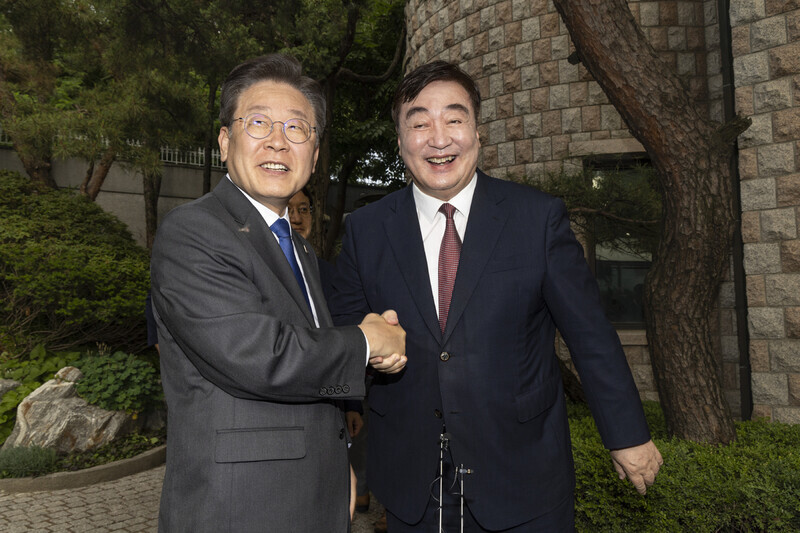hankyoreh
Links to other country sites 다른 나라 사이트 링크
Ruling, opposition parties in Korea take dispute on Fukushima water dumping to diplomatic stage

On Thursday, the leader of South Korea’s ruling party met with the Japanese ambassador to Korea while the leader of the opposition party met with the Chinese ambassador to discuss major issues, including Japan’s planned release of radioactive water from the Fukushima power plant into the Pacific Ocean.
As the upcoming release of the contaminated water becomes a political flashpoint in Korea, both party leaders are seeking to make full use of the diplomatic stage.
“Considering how frustrated I had been with our two countries’ strained relationship, I think our current push to restore relations is a step in the right direction,” said Kim Gi-hyeon, head of Korea’s ruling People Power Party, during a meeting with Japanese Ambassador Koichi Aiboshi at the National Assembly on Thursday.
Kim went on to address the release of contaminated water from Fukushima. “Malicious propaganda and incitement will only hinder the development of bilateral relations and cause grievous harm to fishermen. In light of that, we need Japan to transparently and proactively work with us to eliminate distrust through an objective and scientific approach.”
“I want to provide a highly transparent and sincere explanation based on scientific evidence while continuing to communicate closely with the Korean government in the future,” Aiboshi said in response.

On the same day, Lee Jae-myung, head of the Democratic Party, visited the Chinese Embassy in downtown Seoul for a meeting with Chinese Ambassador Xing Haiming.
Lee mentioned “concerns about a serious loss of trust and respect between Koreans and Chinese since the two countries’ establishment of diplomatic relations” in the meeting, in an apparent reference to Korean President Yoon Suk-yeol’s bias toward the US and Japan in his foreign policy.
“I think [our two countries] ought to speak with one voice and explore joint countermeasures, if possible, in regard to the issue,” the opposition leader also suggested on the topic of the Fukushima water release.

“China and Korea need to do their best to keep the contaminated water from being dumped into the ocean so as to protect the lives and safety of their respective peoples,” Xing replied.
“What I can say for certain is that anyone who is currently betting on China’s defeat will certainly come to regret that,” the Chinese ambassador said, harshly criticizing the Yoon administration for bolstering relations with the US and trilateral cooperation with the US and Japan as part of its US-oriented “values diplomacy.”
Noting that the Democratic Party “has long been a major proponent of mutually beneficial cooperation between our two countries,” Xing also asked Lee to “play a proactive role in the constructive development of our bilateral relations.”
Lee spoke with Xing over dinner at the Chinese ambassador’s residence in Seoul’s Seongbuk District at 6 pm Thursday.
Chun Jun-ho, Lee’s chief of staff, told reporters Thursday evening that “Lee and Xing had a candid conversation aimed at bilateral economic cooperation and the establishment of peace in Northeast Asia” during a dinner that lasted for around two hours. Chun added that they “exchanged serious concerns about [the release of] the contaminated water at the Fukushima nuclear plant.”
By Shin Min-jung, staff reporter; Kang Jae-gu, staff reporter
Please direct questions or comments to [english@hani.co.kr]

Editorial・opinion
![[Column] Tariffs on China: Trump was dumb, Biden dumber [Column] Tariffs on China: Trump was dumb, Biden dumber](https://flexible.img.hani.co.kr/flexible/normal/500/300/imgdb/original/2024/0520/191716191153918.jpg) [Column] Tariffs on China: Trump was dumb, Biden dumber
[Column] Tariffs on China: Trump was dumb, Biden dumber![[Column] What if Seoul took reunification by force off the table? [Column] What if Seoul took reunification by force off the table?](https://flexible.img.hani.co.kr/flexible/normal/500/300/imgdb/original/2024/0520/3017161928630494.jpg) [Column] What if Seoul took reunification by force off the table?
[Column] What if Seoul took reunification by force off the table?- [Editorial] Intensifying US-China rivalry means Seoul must address uncertainty with Beijing sooner than later
- [Column] When ‘fairness’ means hate and violence
- [Editorial] Yoon must stop abusing authority to shield himself from investigation
- [Column] US troop withdrawal from Korea could be the Acheson Line all over
- [Column] How to win back readers who’ve turned to YouTube for news
- [Column] Welcome to the president’s pity party
- [Editorial] Korea must respond firmly to Japan’s attempt to usurp Line
- [Editorial] Transfers of prosecutors investigating Korea’s first lady send chilling message
Most viewed articles
- 1Xi, Putin ‘oppose acts of military intimidation’ against N. Korea by US in joint statement
- 2Kim Jong-un wanted to meet with residents of shelled Yeonpyeong Island in South, Moon recalls in mem
- 3To weigh costs and benefits, Korea must stop treating US troop presence as a sacred cow
- 4[Column] What if Seoul took reunification by force off the table?
- 5Berlin mayor hints at tearing down ‘comfort women’ memorial in city
- 6[Column] Tariffs on China: Trump was dumb, Biden dumber
- 7For new generation of Chinese artists, discontent is disobedience
- 8[Exclusive] Truth commission to seek additional murder charges for figures behind 1980 Gwangju massa
- 9[Editorial] Transfers of prosecutors investigating Korea’s first lady send chilling message
- 10China, Russia put foot down on US moves in Asia, ratchet up solidarity with N. Korea